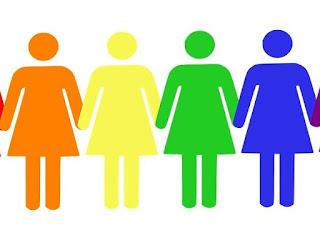Theological Feminism & Gay Activism in the Church
‘I do not permit
a woman to teach and have authority over a man.’ -1Tim 2
‘Wives, submit
to your husbands. Husbands, love your wives.’ -Col 3
Feminism and LGBTism in the Church
If you didn’t
burn the book after the last reading, well done. Perhaps you are a Feminist who
has dared to go outside your echo chamber by reading this―that’s exceptional. At
least you are open-minded enough to explore relevant questions and objections
to your beliefs. Well done.
Here is another question: Why are the denominations that embraced
Feminism a generation or two ago now being invaded by LGBT activism but not the
ones that didn’t? Earlier this year, it was the URC who marked their 100th
anniversary of ordaining women with a call to all churches to start ‘marrying’
gay couples. There is great pressure within Methodism and CoE to do the same.
If you identify as an ‘Egalitarian’ who also embraces the
historic, Christian understanding of marriage between one man and one woman,
ask yourself why Complementarian or Patriarchal denominations have so little
internal trouble in resisting the pressure to capitulate to LGBT activism while
the TF ones (CoE, URC, Methodism, etc) are struggling to stay faithful on this
point? Why do you think that is? Not only have FIEC, New Frontiers, Roman
Catholicism, AMiE, Eastern Orthodoxy, large segments of Pentecostalism, and
other non-Feminist denominations generally avoided the huge drop in attendance
over the last few decades (some have actually grown) but they are not being
overrun by Rainbow Jihadis either.
Could it be that the same
questionable hermeneutics used to dismiss passages that support gender roles in
the church and the home are now being used on marital relationships? Some think
so―and it is worth publicly discussing the issue. Let’s have some fair and open
talk on the connection.
Perhaps TF’s most devastating
legacy is that, just like John prepared the way for Christ, so TF prepared the
way for something bigger than itself. TF has prepared the path for LGBTism.
Denominations that were infected with this ideological virus are now faced with
the next logical step. ‘Since a woman can
be a bishop or a pastor, why not a husband and father too? Why can’t a man be a
wife or mother?’ The questions are fair. If we base titles only on perceived
ability―with gender never being a factor―why bar a woman from being a husband
or dad if she claims she can do it? Isn’t that ‘gender discrimination’?
Yes, it is. And the churches in the UK, USA and the West
are in great need of godly gender discrimination once again. This does not mean
we value one gender above the other. To discriminate (from the Latin discriminat : to distinguish between)
means we are able to discern the unique beauty and calling God has put in us
respectively as men and women. When we can discriminate between the genders in
a godly way we can see why the Biblical view of marriage makes sense. It is a
sacrament pointing to Christ and his church. Marriage was created―not just to
give us romantic goose bumps―but to give humanity a picture of the gospel.
Denominations that did not
give into TF a generation ago are not being divided by the current winds and
waves of queer theology. The ones that did are now wrecked by its legitimate
ideological heir.
Come back Peter, Come back Paul
LGBT
theological activism is not an overwhelming, internal issue for most professing
Christian denominations. It is not an internal issue because most denominations
are not intoxicated by the wine of Feminism. Out of the three branches of
Christianity―Catholic, Protestant, and Orthodox―it is only Protestantism that
has opened itself to Feminism to this degree. Catholicism and Eastern Orthodoxy
(for whatever other theological problems they may have) have at least resisted
this modern impulse. It is only a segment of Protestantism that has experimented
with TF―though this segment is
disproportionately larger here in the UK than it is in many other nations.
In our quest for revival and
reformation, at some point we will need to go back to what Paul and Peter said
about gender roles and sexuality in their epistles. We need to see what
commands they gave to men and what commands they gave to women―and we need to
take them seriously. Instructions were given to husbands or to wives. They were rarely given to spouses generically. The Bible could
have given us instructions for clergy
spouses. But it doesn’t. It gives us instructions for elders and elders’ wives.
To love the widow and her son
well, Elijah did not have to become a Feminist. He needed to be a friend.
[See Part One: Boys, Girls, and Menism (MRA) ][See Part Two: Boys, Girls, and Theological Feminism ]
___________________
Extract from Elijah Men Eat Meat: Readings to slaughter your inner Ahab and pursue Revival and Reform (Get Here)
Extract from Elijah Men Eat Meat: Readings to slaughter your inner Ahab and pursue Revival and Reform (Get Here)




Your grasp on church history is not as strong as you think it is.
ReplyDeleteFor a start, the URC haven't even been in existence for 100 years. They started in 1970. The denominations that joined to form the URC included the denomination that the chapel in which you minister used to be affiliated, the Congregational Union, and it was they who were celebrating the 100th anniversary of ordaining women.
By rejecting the ordination of women, you are essentially pissing on your own legacy.